I could’ve sworn I was an extrovert. I spent much of my twenties out and about in the city (NYC is my hometown and will forever have a piece of my heart). I loved the city nightlife. The clubs, lounges & bars, restaurants, big and small. Give me a dance floor, especially an empty dance floor, and I was on it, shaking my ass and swinging my long hair. There’s something so beautiful about seeing people trickle onto the dance floor because you inspired them.
When I embraced the writer in me, I threw myself into the literary scene. I went to poetry readings and book clubs, attended workshops and book launches. Yo estaba hasta en la sopa, as they say.
I have been an avid and active participant of many writing communities, and during the pandemic, I offered dozens of free and donation-based generative writing sessions, many of them themed.
The thing about me is that I always included alone time in whatever I did and wherever I went. I’d take a class or go to a reading, and would get off the train two stops early so I could walk through Fort Tryon park to get home. During the pandemic, I’d teach a class then spend hours putting my hands in soil on my deck. When at a workshop at VONA in San Francisco or Berkeley, or Tin House in Newport, Oregon, I’d escape for a few after lunch. I’d walk the beach and find trails into the trees in Nye Beach; I’d walk thru the side streets of San Francisco when VONA was at USF looking into people’s windows (y’all don’t believe in curtains?). And when VONA moved across the Bay, I’d venture through the UC Berkeley campus, and more than once got a ride to hike among the redwoods. When I’ve traveled to teach in the mountains outside of LA, I hiked into the pristine pine woods in the afternoons.
I am a creature who needs solitude, who cherishes it, since I was that little girl in Bushwick climbing up that plum tree in our backyard and venturing into the junkyard next door. I didn’t always think this was a good thing, especially when community is lauded as necessary, sacred. “Se necesita la gente,” my mother would say.
But as a little girl who endured a lot of abuse and trauma, I climbed into myself, and parts of me never resurfaced.
These are the parts I’ve been tending to over these past few years.
This grief over my mother has been especially isolating, for reasons that I’ve written about and others I don’t care to get into so publicly right now.
This is what I can tell you—I have felt ashamed that I have retreated into myself so much since she died, though I am fully aware that this solitude is what has helped me survive a grief that at times has felt suffocating.
The grief over my brother’s death was different. If you’re new to my work, you should know his name was Juan Carlos and he was my Superman. He died in June 2013 and I have never been the same. For a time, I didn’t know if I could survive losing him. I once googled: Can you die from sorrow? That’s how I learned about broken heart syndrome. I had to make a conscious, deliberate decision to live, and I had to recommit to living every day because every day for a long time felt like dying.
I haven’t felt like that since ma died. This grief has been more quiet, but it has been no less wrecking. And it has in some ways been more dangerous. The grief over losing my brother was so loud, so rageful, it frightened me sometimes, but I expressed it. I told the world.
The grief over my mother’s death, its quiet chipping, is destructive in ways I have nothing to compare it to. The closest thing I can think of is termites, those wood-eating bugs that you don’t know are eating away at the foundation of your house until a contractor comes in and tell you he’s surprised the house hasn’t come tumbling down on you.
What I’m saying is I’m feeling remade by this grief. I don’t have an image of what that remaking looks like or will look like just yet. For now I’m channeling the whirl of emotion into hiking and being in and with nature.
And doodling and making art with markers and pens. (And writing when it comes, of course, which right now is in trickles and whispers.)
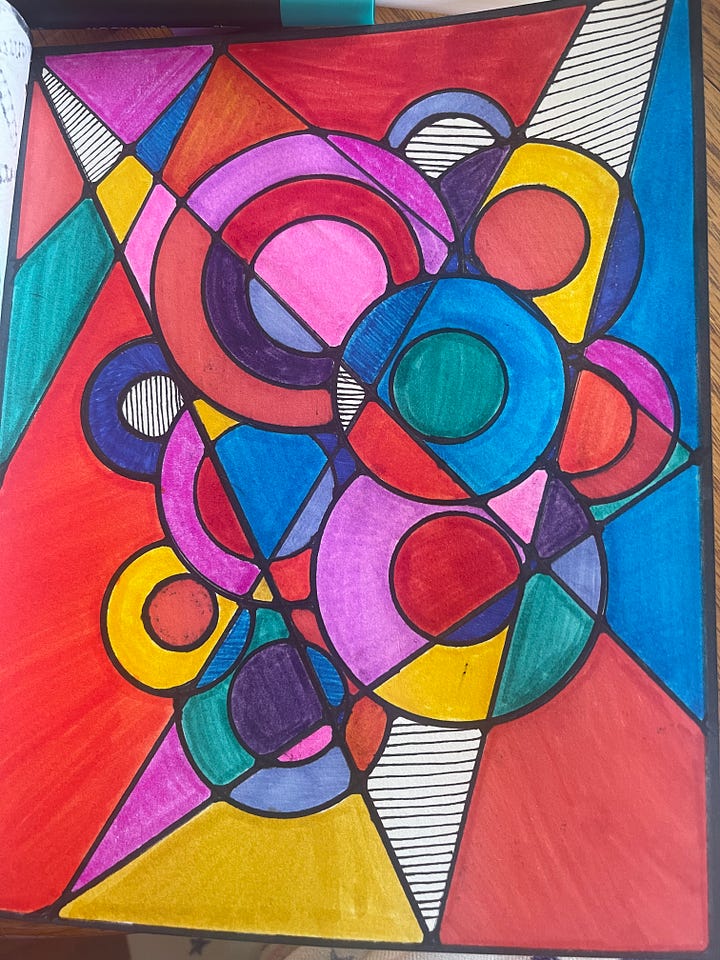

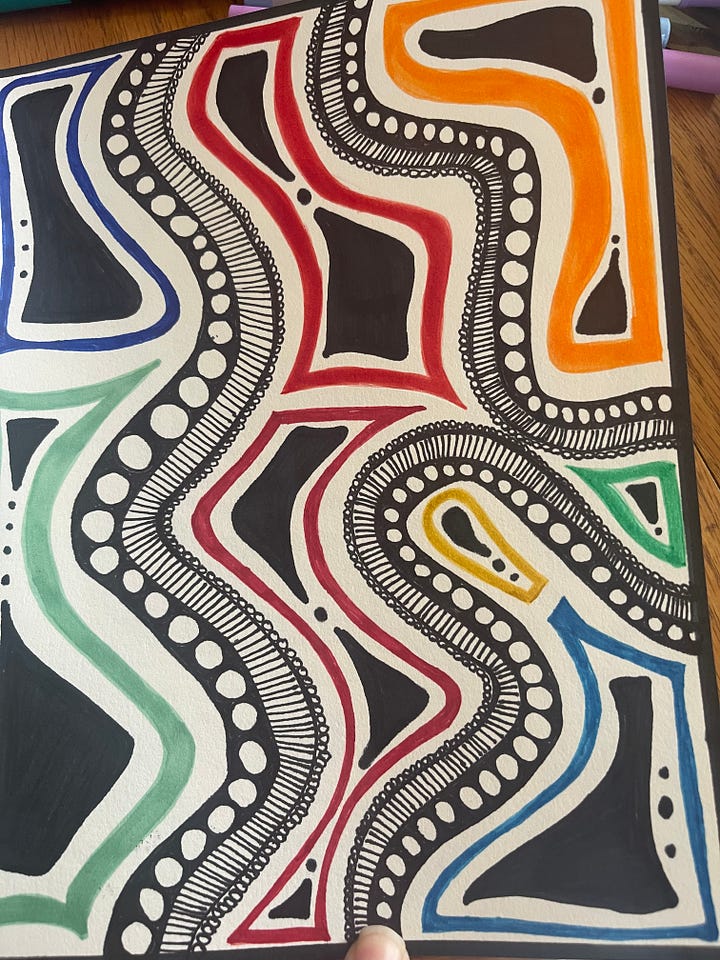

Reading my mother’s letter, her stories about her childhood, the life she wanted that never came to be, I see myself in her in ways I resisted for so long.
An excerpt of a new chapter that surfaced recently reads: I remember the first time I became aware of it. I sat down to eat, a bowl in one hand, a spoon in the other, I tucked my leg under me before sitting down. I looked down, at the bowl and spoon, and thought: “This is so her.” I laughed remembering how ma loved eating with a spoon, no matter where she was. I could see her in my mind’s eye, cradling the bowl just inches from her chin as she scooped the food into her mouth. Then I looked down and saw my knee jutting out from under me. I felt the weight of my body on my foot. It was too much. I stood up quickly and plopped myself back down hard, like a punishment, a swift, stinging slap on the ass. You can’t sit like that. Ma sits like that. We don’t wanna be like ma. I didn’t say this aloud to myself. I don’t think I ever have. But I’ve been whispering it to myself for years. So many many years.
You can’t be like ma. You can’t be like ma. You can’t be like ma.
I’ve denied the ways I am like my mother, but as I read ma’s stories, there it was glaring at me. Ma too was a writer. A surprisingly beautiful one.
Her writing is lush with description and sensory writing—I could imagine her, four and five years old, walking thru the banana plantations in Honduras, the first banana republic. We road a train thru miles and miles of banana orchards to get to Coyoles that first time I visited Honduras in 1985, when I was nine.
Ma had a plum tree in her story too! (I seriously can’t make this shit up, y’all!) The tree marked the end of the road through banana fields and the beginning of the more difficult part of her and Abuelita Tinita’s journey to Tela. Abuelita sat ma down under that plum tree to eat before continuing on.
I have ma’s temper and her don’t fuck with me attitude. Once when we were kids my mother attacked a teenage girl who threatened my sister with a box cutter. I can still see her running out of our building, leaping the two stairs and running towards the girl, all fists and screaming. Ma wasn’t always gentle or affectionate but she didn’t let anyone fuck with us. Only she was allowed to do that.
I also get my generous nature from my mother. Ma was always feeding somebody and doing favors for people. At her memorial, her coworkers said she was a mother figure for many of them. At my baby shower, a homeless man stood outside asking for food. We heard a person who worked at the hall yelling at the homeless man, to leave. Ma yelled, “a la gente no se le niega comida,” and she and my second mom Millie put together an entire tray heaping with food. They always said that where there was one hungry mouth, there were many.
The most striking similarity between my mother and me is the relationship we had with our mothers. That’s so often the case—the mother wound can often be traced through generations. I am unmothered because my mother was unmothered… (I’m not ready to share this material yet but rest assured I am writing it and it is in my memoir.)
I’ve shared a lot during my writing life—about what it’s like to be a writer, about the backlash I’ve received over my writing, about how stories percolate. This writing I’ve been doing lately has made me more quiet. I was offline for months and even before that, I wasn’t on much. I’ve worried about the community I’ve built… will they remember me?
I thought about this when I considered fundraising for Storyknife. I’m glad my want for this residency was louder and more true than any discouraging self talk because community came through. As of this afternoon, I have raised $5403! I am going to Alaska for four weeks to work on my memoir! I just finalized my travel plans and bought my tickets!
We write alone. But there are people waiting for those stories, wanting them. Inhaling deep for the smell of them. Thank you for reminding me of this. Thank you for being my community. Thank you for believing in me and these stories. Thank you thank you thank you.
I’ve decided to keep the fundraiser open & will continue to accept donations, because so many have encouraged me to do so. (And from what I’m hearing from other writers who have attended Storyknife, Homer, Alaska is EXPENSIVE!)
I’ve been hiking in forests I haven’t visited in months. (Yes, I search out old growth forests near my home & anywhere I travel to.) I’ve brought my dog Hutch with me. At 8 months, he’s still very much a puppy and has all the energy to show for it. And turns out he loves hiking too though he needs some training which I’m glad to help him with.
It was him who chose our path earlier this week. I saw him approach and sniff, then he looked at me and I obliged. We traversed the periphery of a lake, climbed slopes, little bridges, a copse of conifers.
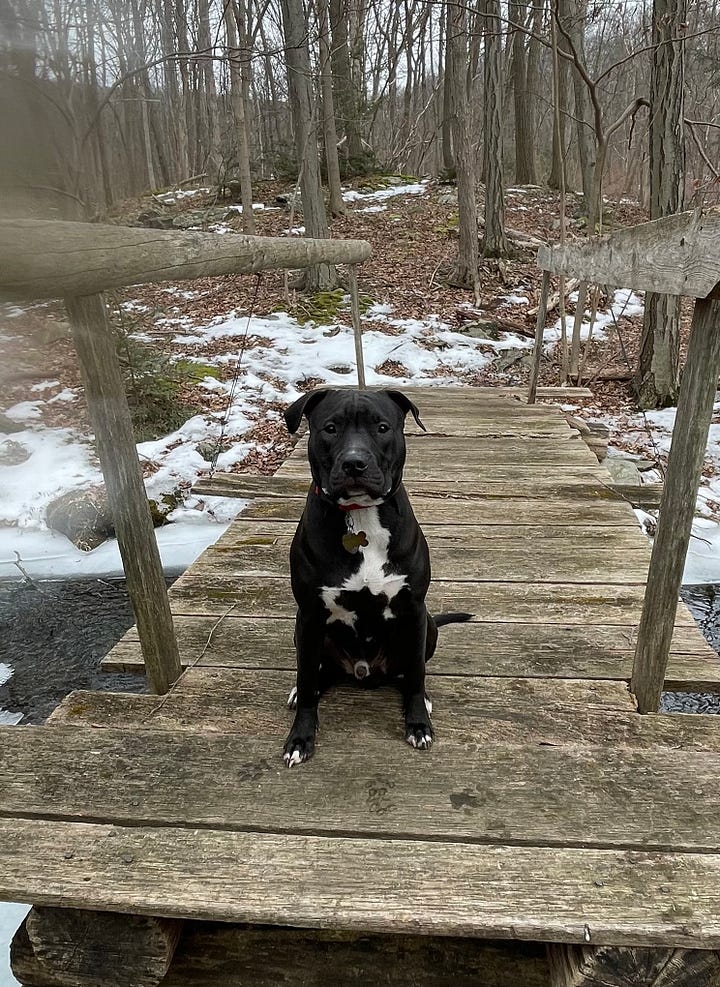
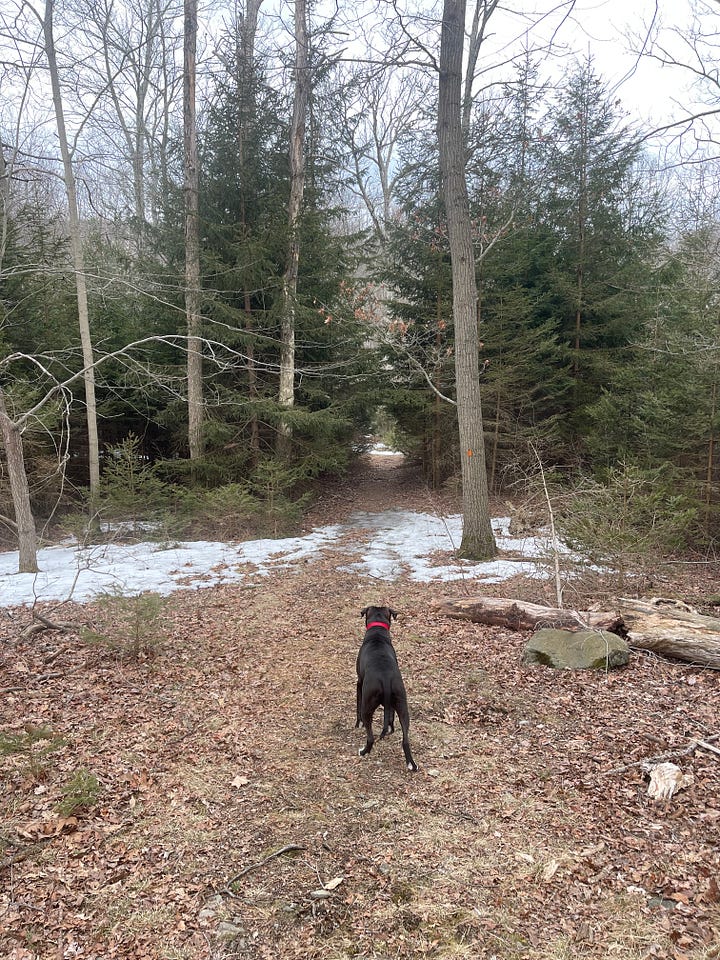
A blanket of green caught my eye—bright green, almost luminescent moss covered fallen trees and rocks. Moss goes dormant in the winter, but it doesn't die. My mind went to an instagram post I saw this past weekend, posted by herbalacademy:
The graphic reads: “Moss loves quiet, hidden places. It flourishes in the shadows, away from the noise, unnoticed by most. Remember, our most amazing transformations often happen when no one is watching.”
I think that’s what I need right now, what I’ve needed for a while and gave myself at the start of the year—quiet. I need to sit with the remaking that’s happening in/within me.
So I’ll be going off social media again for a while.
Los quiero mucho,
Vanessa

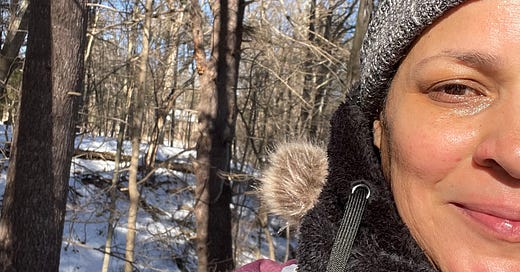



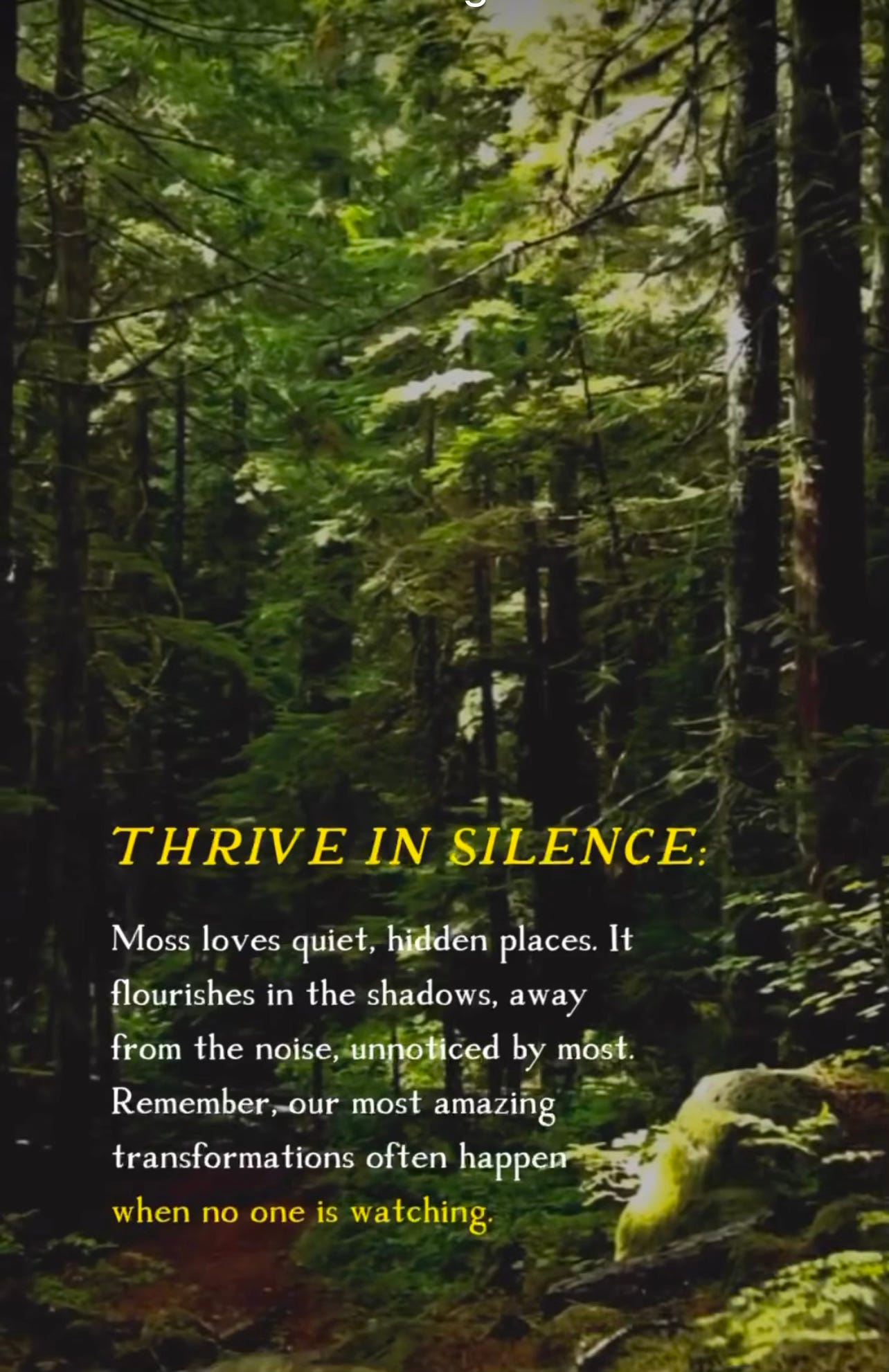
Ohmygoodness this spoke to me so much. Thank you 🌿 (I'm enmeshed in grief rightnow)
Am so looking forward to reading more of your work.